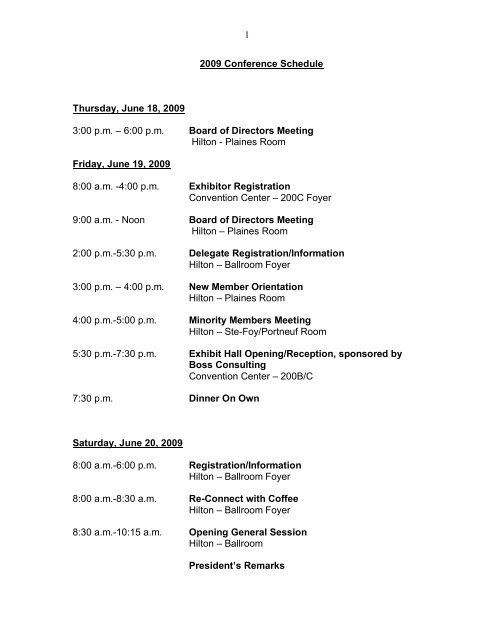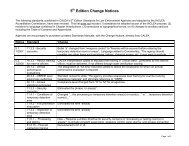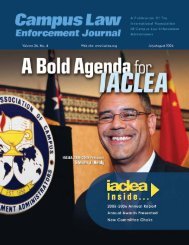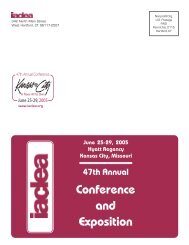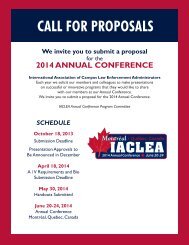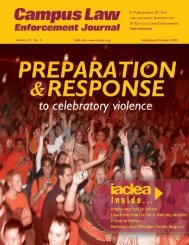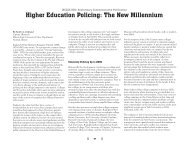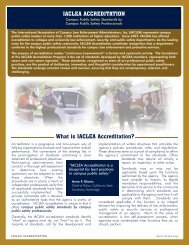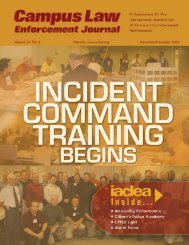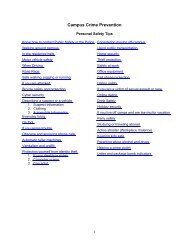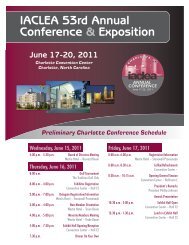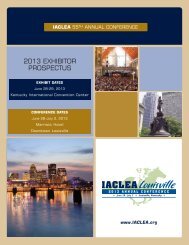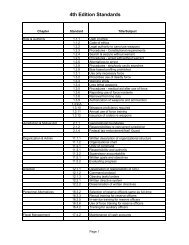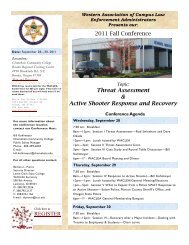2009 Conference Program - IACLEA
2009 Conference Program - IACLEA
2009 Conference Program - IACLEA
You also want an ePaper? Increase the reach of your titles
YUMPU automatically turns print PDFs into web optimized ePapers that Google loves.
1<br />
<strong>2009</strong> <strong>Conference</strong> Schedule<br />
Thursday, June 18, <strong>2009</strong><br />
3:00 p.m. – 6:00 p.m. Board of Directors Meeting<br />
Hilton Plaines Room<br />
Friday, June 19, <strong>2009</strong><br />
8:00 a.m. 4:00 p.m. Exhibitor Registration<br />
Convention Center – 200C Foyer<br />
9:00 a.m. Noon Board of Directors Meeting<br />
Hilton – Plaines Room<br />
2:00 p.m.5:30 p.m. Delegate Registration/Information<br />
Hilton – Ballroom Foyer<br />
3:00 p.m. – 4:00 p.m. New Member Orientation<br />
Hilton – Plaines Room<br />
4:00 p.m.5:00 p.m. Minority Members Meeting<br />
Hilton – SteFoy/Portneuf Room<br />
5:30 p.m.7:30 p.m. Exhibit Hall Opening/Reception, sponsored by<br />
Boss Consulting<br />
Convention Center – 200B/C<br />
7:30 p.m. Dinner On Own<br />
Saturday, June 20, <strong>2009</strong><br />
8:00 a.m.6:00 p.m. Registration/Information<br />
Hilton – Ballroom Foyer<br />
8:00 a.m.8:30 a.m. ReConnect with Coffee<br />
Hilton – Ballroom Foyer<br />
8:30 a.m.10:15 a.m. Opening General Session<br />
Hilton – Ballroom<br />
President’s Remarks
2<br />
President Lisa Sprague<br />
Awards Presentation<br />
10:30 a.m. 2:30 p.m. Exhibit Hall Open/Lunch, sponsored by Genetec<br />
Convention Center – 200B/C<br />
3:00 p.m. – 4:30 p.m. Workshops<br />
A. Higher Education Act Reauthorization and<br />
Clery Act Updates<br />
Lisa Philips, Director of Government and External<br />
Affairs<br />
Dolores Stafford, member of Department of<br />
Education HEA negotiated rule making committee<br />
Convention Center – 202<br />
You will learn about the changes in the Clery Act enacted through the Higher<br />
Education Act (HEA) reauthorization signed into law. While the main categories<br />
of reporting under Clery remain the same, four new categories have been added<br />
under Hate Crime Reporting: larceny, simple assault, destruction of property and<br />
vandalism, and intimidation. Specific definitions will be determined through a<br />
negotiated rulemaking process. Since there is no UCR definition of intimidation,<br />
incidents that appear aimed at specific categories of students and staff will be<br />
developed and available for review at the <strong>IACLEA</strong> <strong>Conference</strong>. You will also<br />
learn about requirements in the new law to maintain a daily log to note fire<br />
incidents which result in personal or property damage. To be negotiated is the<br />
definition of both property and damage. Also included are new missing student<br />
protocols. Finally, you will receive an update on the negotiations over the<br />
thorniest issue of the Act, specific guidance on what is an emergency incident<br />
and how institutions should respond in a timely manner.<br />
B. Crowd Management Quebec City: Lessons<br />
Learned<br />
JeanPierre Verville<br />
Inspector, Quebec City Police Department<br />
Convention Center 203<br />
For over 90 years, Quebec City has been the host to many events and<br />
gatherings: the conscription’s riot in 1918, the Queen’s visit riot in 1964, the<br />
Quebec’s Summit of the Americas in 2001, and the recent Quebec’s StJean riot.<br />
The presence of the provincial Parliament in Quebec also brings hundreds of<br />
violent and nonviolent gatherings each year. But how, between mass meetings,<br />
gatherings and riots, did the Quebec City Police Department learn how to<br />
manage, control and predict the unpredictable? Over the last century, they<br />
learned many valuable lessons in planning, preparing and implementing<br />
comprehensive crowd management. As a consequence of experience, studies<br />
and training, their procedures are now considered to be a benchmark in the field.
3<br />
The 2008 visits of Sir Paul McCartney and of Celine Dion, both events attracting<br />
over 200,000 people, have indeed proved very important lessons have been<br />
learned.<br />
4:30 p.m.5:30 p.m. Two Year Institution Meeting<br />
Hilton – Beauport Room<br />
6:00 p.m. – 9:00 p.m. Host Event<br />
Laval University<br />
9:00 p.m. – 11:30 p.m. Women Members Dessert reception<br />
Hilton Plaines Room<br />
Sunday, June 21, <strong>2009</strong><br />
7:30 a.m.5:00 p.m. Registration/Information<br />
Hilton Ballroom Foyer<br />
7:00 a.m. – 8:30 a.m. Torch Run<br />
Plains of Abraham<br />
9:00 a.m.–10:30 a.m. General Session: Campus Safety Yesterday,<br />
Today and Tomorrow<br />
Michael Dorn, Executive Director, Safe Havens,<br />
Inc.<br />
Hilton Ballroom<br />
This dynamic, fast paced and informative session will help to dispel many<br />
campus public safety myths that dominate the media and popular perceptions<br />
among staff, students, and parents. You will hear a brief historical overview of<br />
major campus safety incidents, followed by tangible and practical real world<br />
action steps to make our campuses safer. Michael Dorn will cover the most<br />
critical issues related to higher education weapons assault prevention, threedimensional<br />
emergency preparedness, antiterrorism concerns and where<br />
campus safety is headed in the future. During his 25year public safety career,<br />
Michael Dorn has served as a university police officer, corporal, sergeant,<br />
lieutenant and school district police chief. He was appointed as School Safety<br />
Specialist for the State of Georgia and also as Lead <strong>Program</strong> Manager in the<br />
Terrorism Division of the State of Georgia Office of Homeland Security.<br />
10:30 a.m. – 12:00 Noon Annual Business Meeting<br />
Hilton Ballroom<br />
12:00 Noon1:30 p.m. Lunch with Corporate Partners
4<br />
Convention Center – 200 A<br />
1:30 p.m. – 3:00 p.m. Workshops<br />
A. Legal Update<br />
Oren Griffin, Assistant Professor of Law, Mercer<br />
Law School, Macon, Georgia<br />
John Marshall, Associate University Counsel,<br />
Kennesaw State University, Kennesaw, Georgia<br />
Convention Center 204AB<br />
The safety of student, faculty, and staff at colleges and universities has become<br />
a paramount concern for decisionmakers at practically every level of the<br />
institution and among other important stakeholders such as parents, legislators<br />
and the community atlarge. This presentation will explore recent state and<br />
federal statutes related to campus safety and security. Also, the session will<br />
examine recent court decisions that impact the challenges confronted by campus<br />
safety officers and administrators. Finally, the session will offer updated lessons<br />
learned in light of recent oncampus tragedies and identify legal concerns that<br />
college and university law enforcement personnel should recognize and<br />
understand.<br />
B. Chiefs Panel on Accreditation<br />
John Leonard, <strong>IACLEA</strong> Director of<br />
Accreditation & LEMAP <strong>Program</strong>s<br />
Convention Center – 205 AB<br />
This workshop will review the history of <strong>IACLEA</strong>’s accreditation efforts and<br />
provide an overview of the features, requirements and benefits of the<br />
Accreditation <strong>Program</strong>. Intended to outline the critical steps to achieving<br />
accreditation, it will identify and explain the principal duties of an Accreditation<br />
Manager, including preparing a selfassessment plan, writing effective directives,<br />
organizing accreditation files, and preparing for an onsite assessment.<br />
C. Don’t Be That Guy, Don’t Be That Girl<br />
Rosemary Briscoe, Special Constable,<br />
University of Windsor, Campus Community<br />
Police<br />
Convention Center 203<br />
Learn about an innovative alcohol and drug abuse awareness, education, and<br />
enforcement program created by the University of Windsor. In developing this<br />
program the university wanted to be proactive, combining all university<br />
departments and the community to address all aspects of alcohol and drug use<br />
on campus, not just awareness. A model was designed based on the best<br />
practices from other institutions that fit the needs of the university’s students.<br />
“Don’t Be That Guy, Don’t Be That Girl,” is a comprehensive alcohol and other<br />
drug prevention collaborative program between numerous departments at the<br />
University of Windsor (including Campus Community Police, Residence Life,<br />
Health Services, Educational Development, students) and local community
5<br />
substance abuse prevention organizations, such as the Teen Health Centre and<br />
the Centre for Addiction and Mental Health. The program’s objective is to reduce<br />
alcohol and drug related problems on campus through three key areas:<br />
education/awareness, intervention/treatment, and policy/enforcement. The<br />
program emphasizes a balance between a student’s academic and social lives.<br />
You will gain insights into this innovative program to reduce alcohol and drug<br />
abuse through awareness and prevention strategies.<br />
D. A Model for Campus Emergency<br />
Management<br />
Glenn Phyper, Challenging Risk, Inc.<br />
Convention Center – 202<br />
A consultant’s research indicates that many institutions are insufficiently<br />
prepared to deal with emergencies and disasters, due to several factors. These<br />
factors include reliance on official written plans instead of institutionwide<br />
synergistic planning, an eventdriven perspective that narrows the scope of<br />
anticipation to a specific hazard, and a disconnection between the theoretical and<br />
practical spheres of campus emergency managers and planning teams. This<br />
presentation demonstrates how these identified problems have affected<br />
emergency preparedness in the prevention, mitigation, response, recovery and<br />
continuity phases. The presentation will feature a model that provides insight into<br />
the complexities of emergency management and enables a focused discussion<br />
on the issues and essential elements required for the application of appropriate<br />
emergency management concepts and processes.<br />
3:00 p.m. – 3:30 p.m. Refreshment Break<br />
Convention Center<br />
3:30 p.m. – 5:00 p.m. Workshops<br />
A. Legal Update<br />
Oren Griffin, Assistant Professor of Law, Mercer<br />
Law School, Macon, Georgia<br />
John Marshall, Associate University Counsel,<br />
Kennesaw State University, Kennesaw, Georgia<br />
Convention Center 204AB<br />
The safety of student, faculty, and staff at colleges and universities has become<br />
a paramount concern for decisionmakers at practically every level of the<br />
institution and among other important stakeholders such as parents, legislators<br />
and the community atlarge. This presentation will explore recent state and<br />
federal statutes related to campus safety and security. Also, the session will<br />
examine recent court decisions that impact the challenges confronted by campus<br />
safety officers and administrators. Finally, the session will offer updated lessons<br />
learned in light of recent oncampus tragedies and identify legal concerns that<br />
college and university law enforcement personnel should recognize and<br />
understand.
6<br />
B. Active Shooters and Campus Violence: The<br />
Canadian Framework and Realities<br />
Francois Page<br />
Convention Center 202<br />
Canada is no stranger to college and university campus violence. Over three<br />
decades, it has experienced its share of tragic events. The speaker will invoke<br />
these major events and the lessons dearly learned, will explain and draw the<br />
parallels between the phenomenon’s evolution and that of the Canadian judicial<br />
framework, while describing the major differences between Canadian and<br />
American legislation. He will also expand upon the reach of coroner’s report<br />
following the Dawson College event and will put in perspective the greater<br />
questions and challenges for Canadian campus security services over the next<br />
decade.<br />
C. Michael Dorn, Executive Director, Safe<br />
Havens, Inc.<br />
When Young Lives are at Stake – Practical<br />
Campus Emergency Operations Planning<br />
Convention Center 203<br />
This interactive session will draw on participant’s experiences as well as the<br />
instructor’s knowledge to help improve participant’s existing plans. This<br />
informationpacked session will examine the key role of education, public safety<br />
and emergency management personnel before as well as during major incidents.<br />
This presentation will outline the concepts to turn paper plans into three<br />
dimensional plans that will work under the stress and chaos of actual crisis<br />
events.<br />
D. Industry Challenge Round Table<br />
Convention Center 205AB<br />
This roundtable discussion will focus on current issues surrounding CCTV<br />
systems. It will cover various areas of interest to campus law enforcement<br />
administrators, including IP v. Analog, Fixed v. PTZ, Color v. Black & White,<br />
CCTV Network Design Considerations, Video Management Systems (Recording<br />
and Storage), Intelligent Video (Smart CCTV) and Wireless Video and more.<br />
5:30 p.m. – 7:00 p.m. President’s Receptionsponsored by BlackBoard<br />
Hilton – Villeray & DeTourny Rooms<br />
7:00 p.m. – 8:30 p.m. Dinner On Own<br />
Monday, June 22, <strong>2009</strong><br />
7:30 a.m.5:00 p.m. Registration/Information
7<br />
Hilton Ballroom Foyer<br />
8:30 a.m.9:30 a.m. Regional Meetings (Hilton Hotel)<br />
North Atlantic – De Tourny Room<br />
MidAtlantic – SteFoy Room<br />
MidAmerica – Portneuf Room<br />
Southeast – Courville Room<br />
Southwest – Montmorency<br />
Mountain Pacific – Beauport Room<br />
Canada – Beaumont Room<br />
International – Belair Room<br />
9:30 a.m.10:00 a.m. Coffee/Refreshments<br />
Hilton Ballroom Foyer<br />
10:00 a.m.11:30 a.m. General Session:<br />
Lessons Learned: A Panel on Emergency<br />
Management<br />
Moderator, Raymond Thrower, King Abdullah<br />
University of Saudi Arabia<br />
Daniel Major, Chief of Security, Bishop’s<br />
University, Sherbrooke<br />
Hilton Ballroom<br />
University of Texas at Galveston, Texas<br />
Union University<br />
Bishop’s University, Sherbrooke, Canada<br />
Tornados, hurricanes and floods can happen quickly and can threaten lives and<br />
cause enormous property damage. This workshop will focus on campus<br />
response to weatherrelated catastrophic events that have occurred recently at<br />
several campuses. Campus public safety officials who have experience dealing<br />
with catastrophic weather events will share what they’ve learned and how to<br />
prepare for and respond to such events.<br />
11:45 a.m. – 1:30 p.m. Lunch on Your Own<br />
1:30 p.m.3:00 p.m. Workshops<br />
A. The Future of Campus Law Enforcement<br />
Paul Ominsky, Director of Public Safety,<br />
Mount Holyoke College<br />
Elizabeth Cohn, Planning and Community<br />
Outreach Coordinator, Mount Holyoke<br />
College<br />
Hilton – Beauport/Beaumont/Belair Room<br />
What will campus security look like in ten years? In twenty years? Recent events<br />
have focused attention on crisis planning and timely response to incidents of gun<br />
violence. As serious as these incidents are, they are rare. Campus law
8<br />
enforcement administrators need to think about security from every angle and<br />
utilize multiple strategies to improve effectiveness of our operations within the<br />
many changes taking place in higher education—financial constraints, increased<br />
risk of litigation, a stricter regulatory environment, higher expectations of service,<br />
challenges in hiring, and everincreasing diversity among the individuals and<br />
communities that we serve. This presentation will focus on four areas that hold<br />
promise for longterm change in campus law enforcement: shared management<br />
and regionalization, department accreditation, improved recruitment, training, and<br />
mentoring, and effective use of civilian community outreach. The presenters will<br />
wrap up the program with a discussion of how current challenges in our field can<br />
serve to create opportunities to rethink the role of our departments in the larger<br />
campus context. Participants will leave with new perspectives on how to work<br />
effectively within the broader educational environment and new inspiration to<br />
think creatively about opportunities on their own campuses.<br />
B. Forging a Relationship with your<br />
International Student Department<br />
Ralph Avery, Staff Sergeant, Public Safety<br />
Division, Northeastern University<br />
Hilton – Porte du Palais Room<br />
Based on a successful inservice training program sponsored by the<br />
Northeastern University Public Safety Division and followup activities, this<br />
program will explore strategies for more effective outreach to international<br />
students. The Division sponsored a twohour block of instruction entitled<br />
"Interacting with International Students." Associate Dean Scott Quint, the<br />
Director of the University "International Student and Scholar Institute" (ISSI) and<br />
some of his staff and some international students, presented a panel discussion<br />
in each of the six sessions during the training program. The goal was to have<br />
officers better understand the backgrounds of some of our international students,<br />
learn about their experiences with their home country police, and appreciate how<br />
those backgrounds and experiences might impact the interactions these students<br />
might have with the officers. Officials distributed a handout with sample problems<br />
that international students face during their time at Northeastern, and some of the<br />
problems and issues were discussed. The program helped some of the student<br />
panelists and ISSI staff members learn more about the Public Safety Division<br />
and its services. As an outgrowth, the Division has lengthened and improved its<br />
participation in the "New International Student Orientation" program and begun a<br />
more formalized and proactive effort to meet all international students and to<br />
assist them in a variety of ways. The Division’s experience can help your<br />
department to further develop strategies and programs to enhance relations and<br />
outreach to international students.<br />
C. Homeland Security OverviewRecent<br />
Updates in Critical Incident Management<br />
Training and Federal Policies
9<br />
Christopher G. Blake, CAE, <strong>IACLEA</strong><br />
Campus Preparedness Project Director<br />
Toni Rinaldi, member, <strong>IACLEA</strong> Domestic<br />
Preparedness Committee and Critical<br />
Incident Management Instructor<br />
Hilton – Porte Saint Louis Room<br />
Learn about the next phase in <strong>IACLEA</strong>’s popular critical incident management<br />
training program. This allhazards course provides practical, handson training to<br />
prepare commandlevel emergency responders to deal with any type of incident,<br />
from a terrorist attack to a weatherrelated event. Funded by a U.S. Department<br />
of Homeland Security grant, this program has resulted in the training of more<br />
than 2,500 campus and noncampus emergency responders over the last three<br />
years. Learn about recent course curriculum changes that have integrated new<br />
federal training protocols and procedures into the course. The threeday course<br />
presents all phases of critical incident management, as well as the concepts<br />
embodied in the National Incident Management System (NIMS) and the Incident<br />
Command System (ICS). It also features a realistic tabletop exercise using a<br />
model campus simulator. This program will also feature an overview of recent<br />
federal policies requiring incident command training for senior higher education<br />
administrators.<br />
D. The FBI and Campus Public Safety:<br />
Keeping our Campuses and Nation Safe<br />
Moderator: Jeff Allison, Special Adviser on<br />
Campus Public Safety, FBI Office of Law<br />
Enforcement Coordination<br />
National Joint Terrorism Task Force<br />
(NJTTF) Campus Liaison Initiative<br />
Jennifer Gant<br />
Supervisory Special Agent<br />
Law Enforcement Online (LEO)<br />
Ron Benson<br />
Supervisor<br />
FBI Academic Alliance Unit<br />
Mark Levett<br />
Unit Chief<br />
Civil Rights Division<br />
Jeff Allison for Cynthia Deitle<br />
Unit Chief<br />
Hilton – Porte/Kent Room
10<br />
Given current and emerging public safety challenges facing our campuses and<br />
nation, it is essential that the partnership between the FBI and campus public<br />
safety agencies continues to thrive. The relationship is built upon trust and a<br />
mutual respect that fosters effective informationsharing and operational support.<br />
Workshop participants will have an opportunity to discuss the various ways the<br />
FBI and campus public safety agencies interface in support of one another’s<br />
critical missions.<br />
3:30 p.m. – 5:00 p.m. Chapter and Affiliate Presidents Meeting<br />
Hilton – Plaines Room<br />
8:30 p.m. – 11:00 p.m. Scholarship Fund Silent Auction<br />
Hilton – Porte du Palais Room<br />
Tuesday, June 23, <strong>2009</strong><br />
8:00 a.m.10:00 a.m. Installation Breakfast, sponsored by Weldon,<br />
Williams & Lick<br />
Volunteer Recognition<br />
Installation of Officers and Directors<br />
Remarks by Incoming President<br />
Hilton – Ballroom


